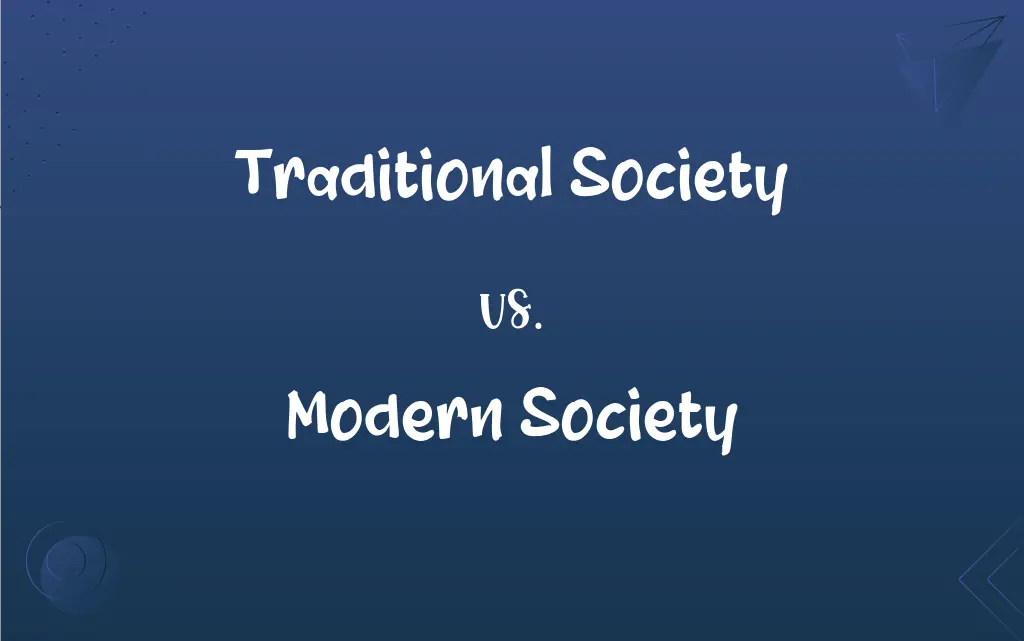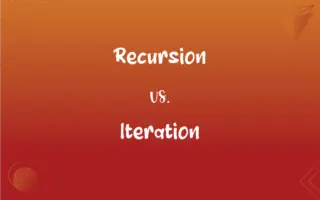Traditional Society vs. Modern Society: What's the Difference?
Edited by Aimie Carlson || By Harlon Moss || Published on February 20, 2024
Traditional society adheres to established customs and lifestyles, often with a rural focus, while modern society embraces change, innovation, and urban-centric progress.

Key Differences
Traditional society is often characterized by a strong adherence to long-standing cultural, religious, and social norms. It typically values continuity and the preservation of the past. Modern society, in contrast, is marked by rapid change, embracing new ideas, technologies, and cultural diversity.
In traditional societies, roles and relationships are often defined by historical precedents and established structures, such as familial hierarchies. Modern societies tend to emphasize individualism, with more fluid and varied social roles that are less bound by historical or familial expectations.
Economically, traditional societies are often agrarian or rely on manual labor, with a focus on subsistence and local trade. Modern societies are characterized by industrialization, advanced technology, and a globalized economy, prioritizing efficiency and innovation.
Traditional societies usually have a slower pace of change, with changes occurring gradually over generations. Modern societies experience rapid and constant evolution, driven by technological advancements and a continuous quest for progress.
In terms of governance, traditional societies often rely on established hierarchies and may have a communal approach to decision-making. Modern societies typically have complex, bureaucratic governance structures, with systems that emphasize legal rationality and institutional processes.
ADVERTISEMENT
Comparison Chart
Cultural Norms
Adheres to long-standing customs
Embraces cultural diversity and new ideas
Social Roles
Defined by historical precedents
More fluid, emphasizing individualism
Economy
Agrarian/manual, focused on subsistence
Industrialized, technology-driven, globalized
Pace of Change
Gradual, over generations
Rapid and constant
Governance
Established hierarchies, communal decision-making
Bureaucratic, legal rationality, institutional
ADVERTISEMENT
Traditional Society and Modern Society Definitions
Traditional Society
Governance based on age-old hierarchies and communal values.
Elders often make decisions in a traditional society.
Modern Society
Experiences continuous and rapid societal evolution.
Innovations are quickly adopted in modern society.
Traditional Society
Social structures based on historical and familial norms.
Family roles are strictly defined in traditional society.
Modern Society
Economy driven by industrialization and global connectivity.
Global trade plays a crucial role in the economy of modern society.
Traditional Society
Economies primarily based on agriculture and handicrafts.
Agriculture is the backbone of the traditional society’s economy.
Modern Society
Governed by complex legal systems and institutions.
Modern society relies on a comprehensive legal framework for governance.
Traditional Society
A society that maintains long-standing cultural customs.
In the traditional society, ancient festivals are celebrated with fervor.
Modern Society
A society characterized by technological advancement and change.
Modern society is rapidly evolving with each technological breakthrough.
Traditional Society
Societies where change happens slowly, respecting past practices.
Change is gradual and carefully considered in traditional society.
Modern Society
Emphasizes individual freedom and diverse social roles.
Individual career choices are highly valued in modern society.
FAQs
Are family roles different in traditional societies?
Yes, traditional societies often have strictly defined family roles based on historical norms.
How does individualism manifest in modern society?
Individualism in modern society allows for more personal freedom and diverse social roles.
What defines a traditional society?
A traditional society is defined by its adherence to long-standing cultural customs and practices.
How is modern society different in terms of cultural norms?
Modern society is characterized by cultural diversity and openness to new ideas.
What is the economic basis of a traditional society?
Traditional societies are often agrarian, relying on agriculture and manual labor.
Does traditional society change quickly?
No, traditional society usually experiences gradual change over generations.
Does modern society emphasize legal rationality?
Yes, modern society heavily emphasizes legal rationality and institutional processes.
Is there a focus on global connectivity in modern society?
Yes, global connectivity and trade are key aspects of modern society.
What is the pace of societal evolution in modern society?
Modern society undergoes rapid and continuous societal evolution.
How does technology impact modern society?
Technology drives rapid change and innovation in modern society.
How is governance structured in traditional society?
Governance in traditional society often relies on established hierarchies and communal values.
Are traditional societies more community-oriented?
Yes, traditional societies often prioritize communal values and decision-making.
How do traditional societies view historical customs?
Traditional societies value and seek to preserve historical customs and practices.
Are traditional societies resistant to change?
Traditional societies may resist rapid change to maintain their cultural identity.
What is the role of agriculture in modern society?
While still important, agriculture is often less central in modern society compared to traditional ones.
What characterizes governance in modern society?
Modern society is governed by complex legal systems and bureaucratic institutions.
How are social roles determined in traditional society?
In traditional society, social roles are often determined by long-standing cultural and familial traditions.
How do modern societies view traditional practices?
Modern societies often view traditional practices as part of cultural heritage but focus on innovation.
Can traditional societies be technology-driven?
Typically, traditional societies are less technology-driven compared to modern societies.
How does modern society handle societal norms?
Modern society is often flexible and adaptive regarding societal norms.
About Author
Written by
Harlon MossHarlon is a seasoned quality moderator and accomplished content writer for Difference Wiki. An alumnus of the prestigious University of California, he earned his degree in Computer Science. Leveraging his academic background, Harlon brings a meticulous and informed perspective to his work, ensuring content accuracy and excellence.
Edited by
Aimie CarlsonAimie Carlson, holding a master's degree in English literature, is a fervent English language enthusiast. She lends her writing talents to Difference Wiki, a prominent website that specializes in comparisons, offering readers insightful analyses that both captivate and inform.







































































